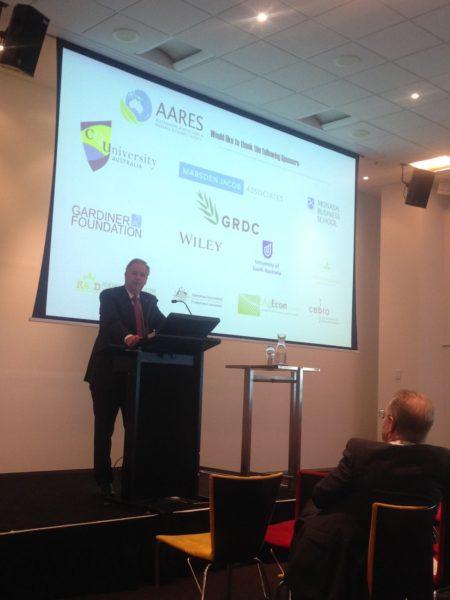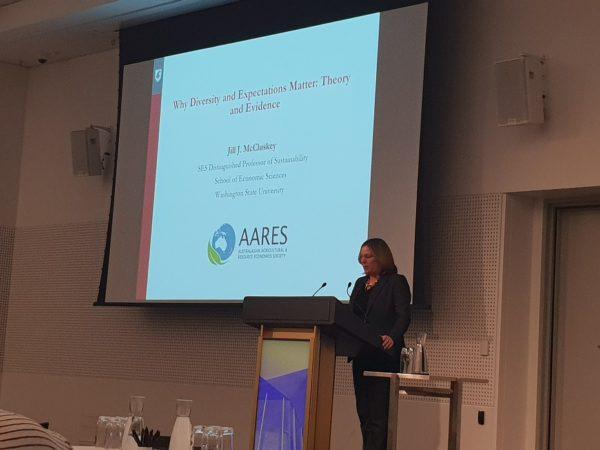Highlights from Day 1 of the AARES conference
GFAR PhD students Sitti Rahma Ma’Mun, Livia Padilha and Alfinura Sharafeyeva look back at the first day of the 63rd annual Australasian Agricultural and Resource Economics Society (AARES) conference that opened in Melbourne yesterday.

Michael J. Taylor opening the AARES conference
Prof. Jo Swinnen in his presentation on ‘Value chains, standards and development’ showed that the number of standards increased dramatically in the recent decades: from a couple of sanitary and phytosanitary standards (SPS) notifications to the WTO in 1995 to more than 20,000 in 2017. Moreover, the standards became more stringent and widespread. At the same time an important message was that the standards can be the Barriers to trade and can be Catalyst to trade.
Below are some key highlights from different sessions during the day:
In the morning symposium, titled “Information in the Australian red meat supply chain”, Prof. Garry Griffith emphasized the importance of whole-chain benefits by retailer, processor and farmer, exemplifying with the case of MSA (Meat Standards Australia). The case was implemented in early 2000’s, when beef consumption in Australia was falling, and today is present in 2/3rd of the beef domestically sold in the country.
During the session on Food, Maria Loureiro presented her paper about European wine where she used a machine learning and facial recognition method during wine tasting. Among her results, she found that emotions are relevant to understanding certain choices and credence quality standards that matter for consumer recognition.
Later in the day, Prof. Kynda Curtis shared some findings from the paper Do multi-labelled food products inform or confuse consumers? The paper concluded that in the case of ‘organic’ and ‘non-GMO’ attributes varied among bread and cookies and that additional information and labels do not increase the consumers’ willingness to pay for the products.
In the Trade session, David Vanzetti, in his preliminary research identified that the welfare impact of Trump’s tariff war is not as significant as it was anticipated at the global level.
Another presenter, James Fell, who estimated ad valorem tariff-equivalents of non-tariff measures (NTM) for Australian grains, found out that the price falls when NTMs are imposed. Moreover, the speaker highlighted that NTMs do not always mean trade barriers.
Dr. Richard Culas shared some prospects for China-Australia Free Trade Agreement and agricultural exports from Australia. He suggested that within growing consumption demand and insufficient production of wheat in China, some Australian states may benefit by exporting wheat to China. The highest revealed comparative advantage was estimated for South Australia.

Prof. Jill McCluskey speaking at the Women in Economics Session
Prof. Jill McCluskey in her speech during the Women in economics (WEN) session, emphasised that “…lack of diversity makes an organization feel closed, old fashioned and out of touch. Broad expertise needs to be sustainable in a future with growing population and limited resources.” Moreover, she concluded that diversity can make us better because we can best utilise human resources and increase innovation.
During the Food and beverages session Prof. Wendy Umberger presented work from GFAR PhD student Christian Genova’s thesis titled The impact of smallholder vegetable production on child nutrition in rural Vietnam‘ , which is part of an Australian Centre for International Agricultural Research (ACIAR) project aimed towards more profitable and sustainable vegetable systems in North West Vietnam. The results from this study highlighted that, the market participation of rural household in Vietnam has a positive effect on children’s diet and health, especially girls.
In the session on Conservation and water quality, Mohsin Rias and Muhammad Ashfaq found out that the participatory irrigation management has a positive impact on water reliability, and agricultural productivity as well as reduces the subsidy in the irrigation system in Punjab province, Pakistan. Thus, the water management was recommended to be further decentralised.
The study ‘The challenges of practical adaptation faced by Nepalese farmers’ presented by Sikha Karki, found that farmers in Nepal response to climate change by changing crop variety, time management and diversification of income source.

Warwick Long of Country Hour interviewing Nikki Dumbrell
GFAR PhD student Nikki Dumbrell did an interview for the Victoria Country Hour. She spoke about how attending the Crawford Fund conference in 2015 sparked an interest in her to pursue a career in agriculture research for international development. She also spoke about her research work at GFAR working on a project in North Western Vietnam funded by Australian Centre for International Agricultural Research (ACIAR) and her current PhD research on‘social licence to operate in agriculture’.

Prof. Sarah Wheeler speaking at the policy session
Prof. Sarah Wheeler along with Jason Alexandra organised a policy session on ‘Putting some facts on the table in regard to water policy and reform in the Murray-Darling Basin’. In her talk Prof. Wheeler outlined some key economic points in the Murray Darling Basin management debate.

Apri Sayekti presenting her paper
GFAR PhD student Apri Sayekti presented preliminary results for her paper ‘The Adoption Dynamics of Chilli Hybrid Varieties in Indonesia’. She found out that participation of female in farming activities is associated with adoption of hybrid varieties of chilli. This study is a project funded by Australian Centre for International Agricultural Research (ACIAR) aiming to more effectively promote the growth and development of Indonesia’s fresh fruit and vegetable value chains, focusing specifically on ways smallholders and rural communities can participate and benefit.
One of the highlights of the day was when GFAR Executive Director Prof. Wendy Umberger was recognised as a Distinguished Fellow of the Australasian Agricultural and Resource Economics Society (AARES).
The first day of the conference was concluded with an inspiring presidential address by Dr. Suzi Kerr on economists and leadership toward emission societies.
